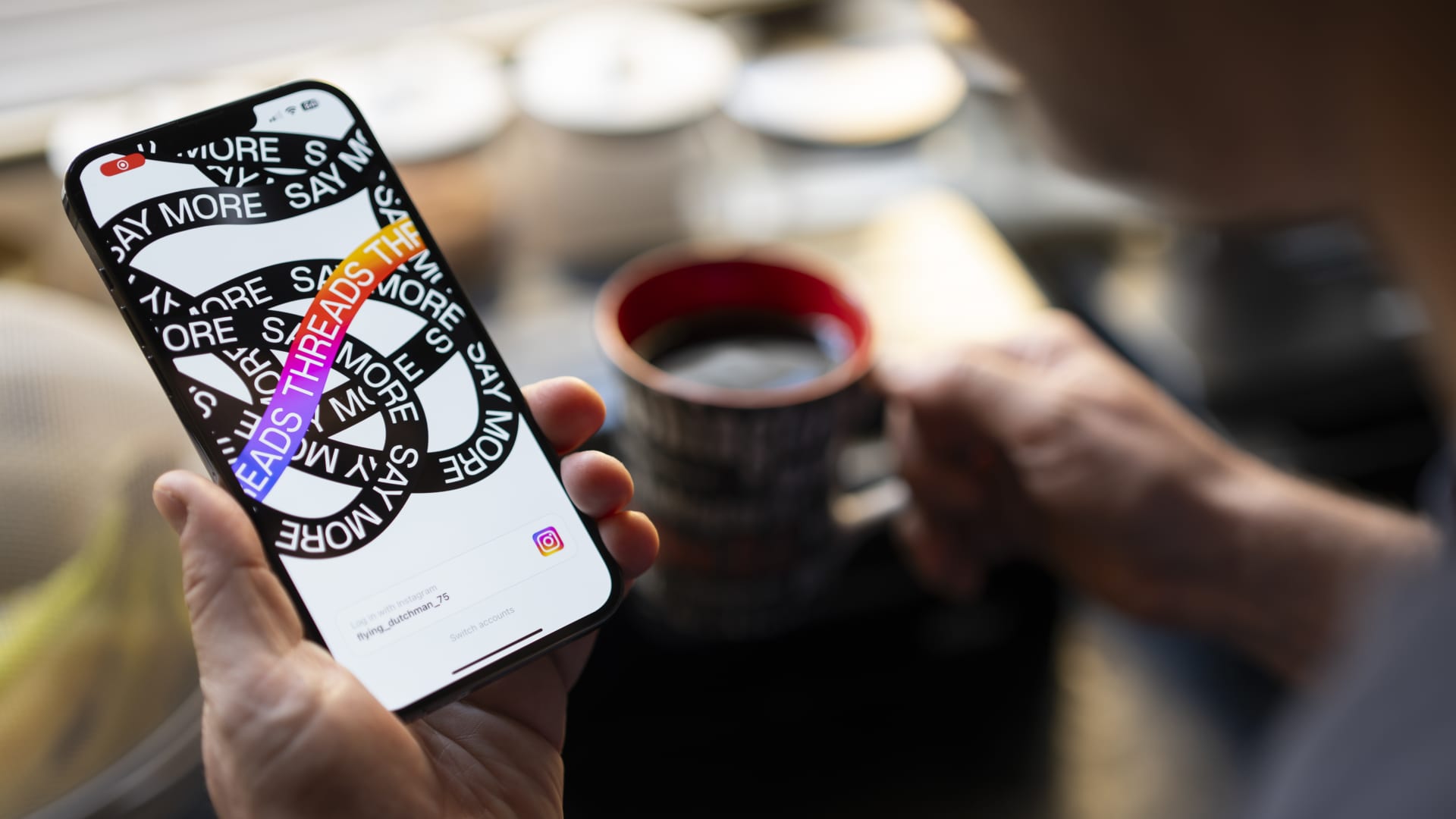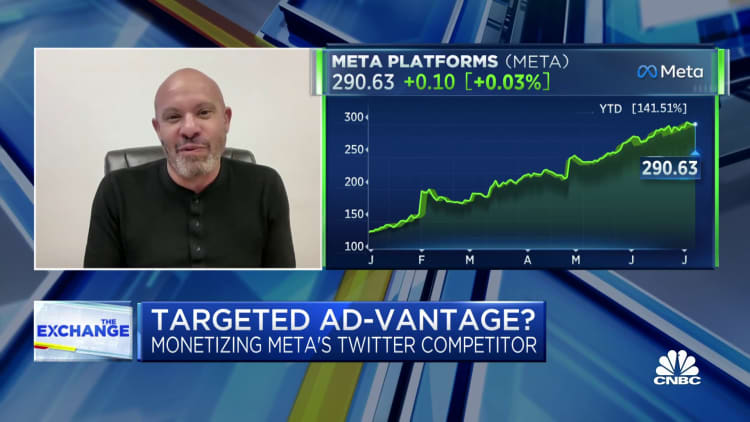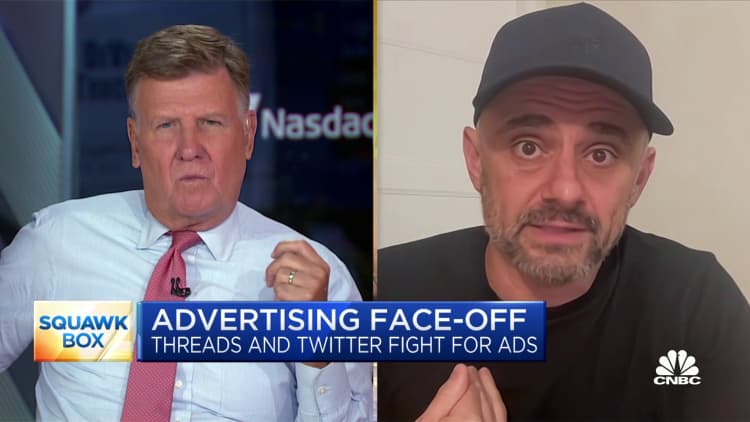

Jaap Arriens | Nurphoto | Getty Images
Brian Moller is a self-described “master threader.”
Since Meta debuted Instagram Threads a day after the July 4 holiday, the radio personality and comedian, whose stage name is B Mo the Prince, has been cracking jokes and playfully bantering with other early adopters of the Twitter clone. In the past week, he’s made several quips about his new Threads compulsion taking precedence over certain life necessities, like sleep.
Moller has spent the last few years building an expansive presence on social media sites like TikTok, Instagram and YouTube as a creator of short comedy sketches, making fun of Gen Z and millennials and how they perceive one another. He now has roughly 3 million followers across social media and online video platforms.
The one major app that’s eluded him: Twitter.
“The vibe was off,” Moller said, regarding the reception to his jokes and posts about comedy sketches on Twitter. “It’s not really the platform for that.”
Power Instagram users like Moller are a big reason why Threads raced to the top of the downloads charts to become one of the fastest-growing consumer apps ever, topping 100 million users in its first week. With Twitter sputtering due to technical glitches and Elon Musk’s erratic behavior turning away many former loyalists, Meta CEO Mark Zuckerberg pounced on the opportunity to kick a rival while it was down.
The hard part is keeping users.
Threads skyrocketed out of the gate in large part because it was easy for existing Instagram users to create accounts on the new messaging service and connect with their established following. But the app is already showing signs of waning momentum, with online analytics firms Sensor Tower and Similarweb reporting a drop in engagement.
Moller is exploring how Threads could become a central service to his online existence and a potential avenue for reaching a bigger audience. He’s hoping that Threads has staying power and that people will continue to open the app throughout the day to engage with his jokes and other forms of entertainment.
Earlier this week, Meta rolled out its first big update to Threads, adding features that make it easier to see followers and a translate button so users can read text in other languages.
Still, Threads lacks key enhancements that could help creators build their audiences on the app beyond their existing Instagram following, said Caspar Lee, whose YouTube channel has more than 6.6 million subscribers. There’s not even a website for users to access via desktop.
“Threads is the really good looking new kid in class that everyone wants to talk to,” said Lee, who also has a venture firm and is co-founder of marketing firm Influencer. “Then over the next few weeks they got to work out whether there’s anything more to them.”
Currently, Threads users are unable to search for topics or hashtags that represent hot topics. The feed is algorithmic, based on who a user follows and content recommended by Instagram. There’s a feel of randomness and unorganized chaos to it. You’re not really part of a conversation.
“That’s a big thing that’s on Twitter, that’s on TikTok and YouTube, that you can jump on a topic, trend and you can get loads of people following you and consuming your content,” Lee said. “It’s going to be interesting to see if people can go from the initial boost they had in the first few days to a continuous growth in the next few months.”
The nicer Twitter
Instagram executives have started by positioning Threads as a kinder alternative to Twitter, discouraging chatter about news and politics and focusing more on entertainment and lifestyle content. Adam Mosseri, the head of Instagram, said Threads can cater to people interested in topics like fashion, sports, music and beauty who have never found like-minded communities on Twitter.
Conflict is a major draw on Twitter, which is often used by high-profile politicians to tout their views and slam those of their rivals.
Lee even created a popular YouTube video five years ago in which he read “mean tweets” with comedian Jack Whitehall. The video has been viewed more than 1 million times.
Moller said he finds Threads to be more welcoming than Twitter and enjoys being able to scroll through and post without having to engage in real-time arguments. One of the few things he does on Twitter is read about sports. Even then, comments can be “so argumentative” that they’re off-putting, he said, adding that the combative nature of discussions has only increased since Musk acquired the company late last year.
Threads, at least so far, “doesn’t have the same vitriol,” he said.
Thilina Kaluthotage | Nurphoto | Getty Images
Marcel Floruss, a fashion influencer with over 580,000 Instagram followers and more than 1 million YouTube subscribers, says it was a “smart move” for Meta to try capturing disillusioned Twitter users as well as people who have have deserted the app.
However, he’s still trying to understand how Threads can help him. Floruss built an influencer career by giving fashion advice and tips, and he never found a way to “offer any value on Twitter,” which he says is more for news, live events and politics.
On Stories, Instagram’s time-limited messaging tool that’s akin to Snapchat, Floruss can share tips along with photos. He also creates content for TikTok, Instagram’s short-video service Reels, Snapchat and YouTube. Floruss said he’s going to “play around” with Threads, but he’s not ready to make it a priority given how much time he spends elsewhere.
“The potential benefit is outweighed by the amount of work that I feel like I need to put in,” he said.
Floruss isn’t alone in taking a wait-and-see approach.
Chas Lacaillade, CEO of influencer talent agency Bottle Rocket Management, said many of his creator clients are holding off with Threads until the app shows it can be a place that can bolster their careers.
“They aren’t looking to go zero to 100 miles on this other thing,” Lacaillade said. “It’s so important not to discredit what you got in search of something that is unproven or is the flavor of the month.”
Creators, Lacaillade said, would rather spend their time deepening existing relationships instead of working on a new social media service that could quickly lose steam.
Threads “had this really splashy entrance,” Lacaillade said. The true test, he said, will be Meta’s ability to find sustained momentum.
As it stands now, creators don’t have a way to monetize their presence on Threads. There’s no advertising, so brands aren’t looking for influencer partners, and it’s not clear if Threads can turn into a channel to help them steer people to sites where they can sell merchandise or promote their Patreon pages, he said.
A Meta spokesperson said in an email that the company’s priority “is to build consumer value first and foremost” in order “to explore how to build business value in a way that doesn’t compromise the consumer experience.”
The spokesperson also pointed to Mosseri’s previous public statements describing how Instagram “has been entirely focused on keeping the lights on and fixing bugs, but we’re starting to priorite the obvious missing features, like a following feed, the edit button, and post search.”
‘Starving for regular monetization’
Creators say YouTube remains the No. 1 outlet for influencers to build lasting careers.
“What other platform outside of YouTube has the ability to keep you or any viewer interested for longer than 30 seconds?” Floruss said. “You have the attention of people that’s worth a lot of money to advertisers.”
While Twitter struggles with advertisers, the site is trying to gain relevance among creators. The company recently began paying some verified users when ads are served in their conversations. That could entice some people to use Twitter over Threads, said Tameka Bazile, who works in artist relations and marketing at Time.
Bazile noted that some Twitter users have posted that they’ve received payments as high as $35,000, and she said that could be an attractive way to draw in “micro-influencers” or “nano-influencers,” who lack big audiences but have established some name recognition in certain communities.
“The creator economy is starving for regular monetization,” she said.
Twitter hasn’t revealed some important details of how it’s paying certain creators like the percentage revenue share they’re getting from ads, industry experts said.
Brendan Gahan, a partner and chief social officer at ad agency Mekanism, said Twitter’s system needs some transparency.
“It feels like right now Twitter has just granted a bunch of random accounts,” Gahan said.
Twitter didn’t provide a comment for this story.
Sasha Kaletsky, co-founder and managing partner of Creator Ventures, said in an email that it’s “almost impossible” for Twitter’s recent influencer payment plans to compete with brand deals from Instagram or YouTube.
Like with Threads, creators will wait to see how Twitter works for their peers before “spending much more time making content there,” Kaletsky said.
Marketing influencer Jack Appleby said his income is derived from a mix of brand sponsorships on platforms like Twitter and LinkedIn and his own newsletter as well as from speaking engagements.
For Threads to become important to creators, Appleby said the app needs to have better analytics so they can measure engagement and prove to brands that they have reach.
Appleby likes how Threads allows for posts to be up to 500 characters, which he said lets him write more complete thoughts. Tweets max out at 280 characters, except for paying subscribers, who can write messages with up to 25,000 characters. Appleby said he definitely doesn’t need that much space.
“My hope is that Threads allows us to like be a little more human,” he said.
As for Moller, the comedian, he’s hoping Threads continues to feel playful and fun. With time and some clever features, perhaps the engagement will be strong enough that it can help his entertainment career.
“This came along, and I was like, I’m sure Zuckerberg is not putting out something half-assed,” he said.
WATCH: Twitter as a product is “dramatically better” under Elon Musk, says Gary Vaynerchuk





